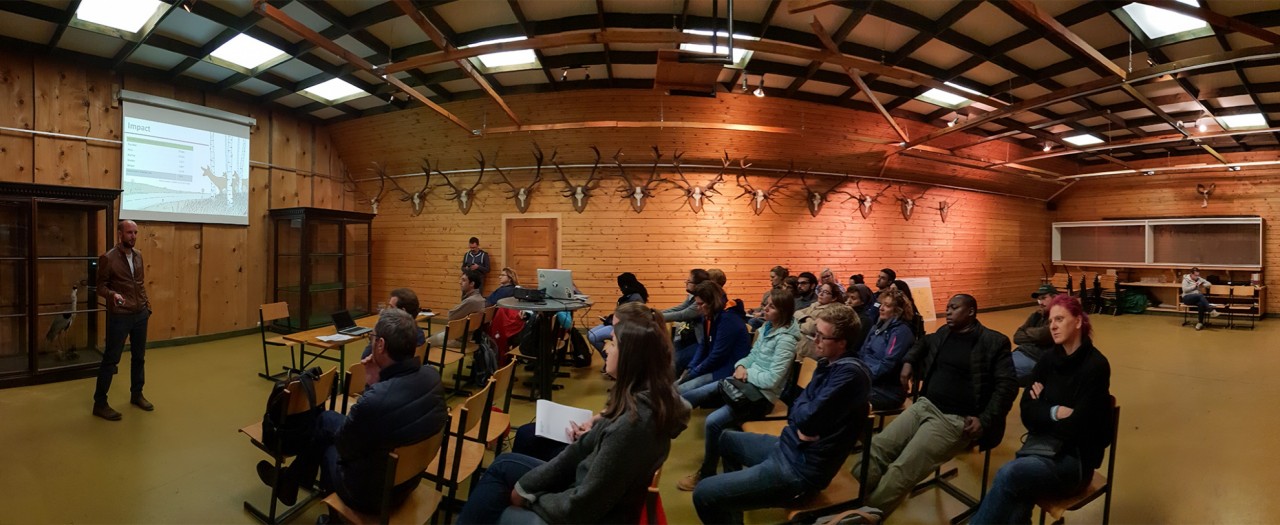Citizen Science Summer School 2018
From 15th to 19th of October, the Citizen Science Summer School "Citizen Science in Theory and Practice" took place in "Grünau im Almtal", a small town in the south of Upper Austria. Grünau is particular famous for the KLF, the "Konrad Lorenz Reseach Station" where zoologist and Nobel Prize winner Konrad Lorenz studied animal behavior and became one of the founders of modern ethology. Not far from the research station, a whole week was dedicated to Citizen Science and many interesting workshops, sessions and collaboration teamwork took place.
Participants in this Summer School came from all over the world and from many different backgrounds, which brought many different perspectives to the group. The various sessions included project presentations, best-practise examples, drafting ideas for Citizen Science projects, talks about communication and data quality and more. You can find the full program here on the KLF website: https://klf.univie.ac.at/summer-school/scientific-programme/
We were not only listening and learning, but were also invited to open one day with a 2 1/2 hour block about praxis in Citizen Science, how Citizen Science Apps are built and why design and data privacy matter when planning a Citizen Science project. During the first block, Philipp focused on what users expect from apps in 2018 and how privacy concerns in an internet environment are influencing the trust and ethics of a Citizen Science project, the second part was more of an open talk about own user experiences of the participants. Since we are always aiming for strengthening communication and interaction on the SPOTTERON platform, our presentation also included how all projects on the platform benefit from the advanced features, which enable Citizen Science projects to run their own social network directly in the smartphone apps and interactive maps. Our key-message from a designers perspective, that communication and social features matter and have a strong impact, was also backed later on by numbers in the talk of Tina Phillips from the Cornell Lab of Ornithology, who presented an extensive analysis of the motiviation of Citizen Scientists in various projects. Practical design experience and the analysis of participant feedback both came to the same conclusion: Citizen Science needs to have a strong root in interactivity and community building to provide long-term motivation and ongoing participation.
An excursion to the "Wildpark Cumberland", which is also situated in the region, offered the opportunity to visit the famous grey-lag geese and other animal species. It was especially fun to feed the wild boars while having curious ravens fly over, who were then fetching their own share of the feast. While we were visiting the park, the Citizen Science apps "Forschen im Almtal", Project Roadkill and Nature`s Calendar, which are running on the SPOTTERON platform, were put to use. Another amazing moment was to look up during the night and see all the stars and the milky way, stretching over the sky. We could even clearly see the Pleiades with bare eyes!
After a week full of Citizen Science, everybody agreed that we all have gained so many insights and new ideas to carry home.
Speaker List:
- Peter BROWN (Anglia Ruskin University, Cambridge),
- Daniel DÖRLER (University of Natural Resources and Life Science, Vienna),
- Didone FRIGERIO (Core Facility KLF for Behaviour and Cognition & Dept. of Behavioural Biology, University of Vienna, Vienna),
- Florian HEIGL (University of Natural Resources and Life Science, Vienna),
- Philipp HUMMER (SPOTTERON Citizen Science, Vienna),
- Coleman KRAWCZYK (University of Portsmouth, Portsmouth),
- Tina PHILLIPS (Cornell Lab of Ornithology, Ithaca),
- Anett RICHTER (German Centre for Integrative Biodiversity Research, Leipzig)
Last but not least, we want to thank the organisation team Verena Pühringer-Sturmayr, Lara Iaiza and Arno Cimadom for their great work!
Related Posts
Comments
By accepting you will be accessing a service provided by a third-party external to https://www.spotteron.net/
